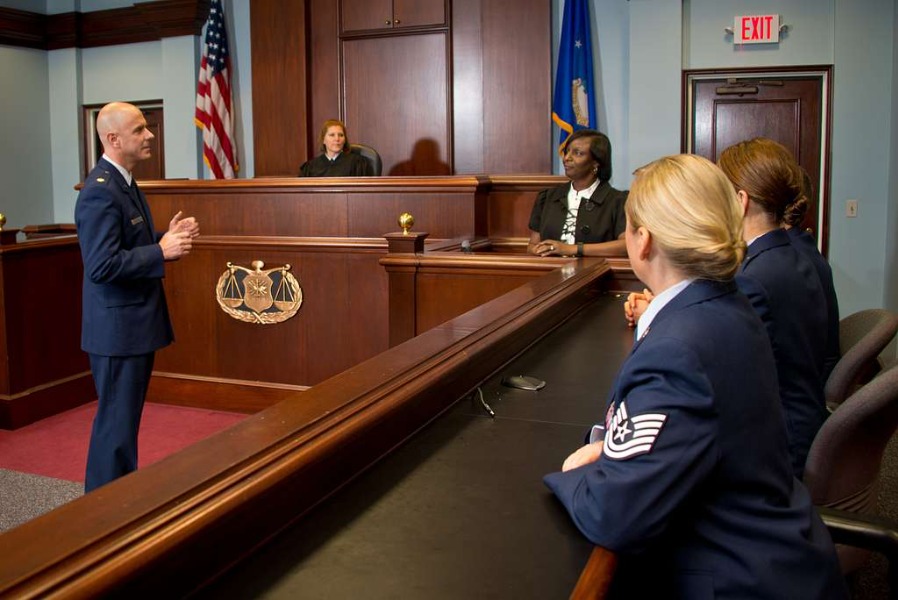The Mueller Protection Legislation Moves Forward—and Shifts Focus
At the beginning of April, commenting on the spate of legislation aimed to protect the special counsel from summary dismissal, Bob Bauer put forward an alternative proposal on Lawfare:
Published by The Lawfare Institute
in Cooperation With

At the beginning of April, commenting on the spate of legislation aimed to protect the special counsel from summary dismissal, Bob Bauer put forward an alternative proposal on Lawfare:
Rather than enact a measure to enforce the special counsel rules, Congress might address one of their serious weaknesses: the absence of any requirement that the special counsel report to Congress. Legislators could require that, if fired, the special counsel provide such a report on the status of the investigation through the date of his dismissal, focusing on whether the inquiry had uncovered credible evidence of potential crimes by the president, his family or close associates. He would give Congress the information it needed to seek judicial assistance in obtaining any and all material relevant to his report that would otherwise be protected under grand-jury secrecy rules.
The idea is to ensure that, in the event of the special counsel’s firing, Congress has access to a record of the investigation and an ability to take political stock, should impeachment be necessary. The existing special counsel regulations only require Mueller to deliver a report to Deputy Attorney General Rod Rosenstein at the conclusion of his investigation, and allow Rosenstein to decide whether to provide that report to Congress.
Over the last two weeks, lawmakers have introduced two separate bills that mesh surprisingly well with Bauer’s proposal. In the House, Democratic Reps. Lloyd Doggett, Jamie Raskin, Ted Lieu and David Cicilline put forward the “Special Counsel Transparency Act.” In the Senate, an amendment added by Judiciary Committee Chairman Chuck Grassley would likewise introduce a reporting requirement to the special counsel’s work. But perhaps the most surprising thing is that, after months of congressional stalling, at least one of these bills is actually moving forward: the Senate Judiciary Committee voted by a 14-7 margin on Thursday to advance legislation including Grassley’s amendment to the Senate floor. Notably, four Republicans—Grassley, along with Sens. Lindsey Graham, Thom Tillis, and Jeff Flake—joined the committee’s Democrats in voting for the bill.
Of course, Senate Majority Leader Mitch McConnell has promised not to let the Judiciary Committee legislation come to a vote. And Speaker of the House Paul Ryan has voiced similar disdain for any legislation that might make it that far in the House. So the House bill shows no signs of going anywhere anytime soon—and though the Senate bill is a warning signal to the president from a committee that has been all too willing to enable his worst impulses over the past year, it has little hope of actually becoming law.
Nevertheless, insofar as the legislation represents a congressional effort to check the president, it’s worth taking a look at what the bills actually propose to do.
The Senate bill, termed the “Special Counsel Independence and Integrity Act,” has gone through numerous revisions to get to its current point. As its name suggests, it’s cobbled together from the “Special Counsel Independence Protection Act” (sponsored by Graham and Democratic Sen. Cory Booker) and the “Special Counsel Integrity Act” (sponsored by Thom Tillis and Democratic Sen. Chris Coons)—with the Grassley amendment added on. It also writes into law the existing special counsel regulations.
The core of the bill, and the aspect of it that’s created the most controversy, is its creation of a mechanism by which a special counsel can appeal his or her dismissal before a special panel of the U.S. District Court for the District of Columbia. During the Judiciary Committee hearing on Thursday, Sen. Ben Sasse spoke for a number of the bill’s critics when he voiced concern that this provision would be unconstitutional as a matter of separation of powers: “Many of us think we are bound” by Justice Antonin Scalia’s lone dissent in Morrison v. Olson, he said. But given that Morrison, at least on its face, appears to still be good law, the more relevant critique might be that any such appeal by Special Counsel Robert Mueller would be vulnerable to constitutional challenge—even if that challenge didn’t succeed—which would create a great deal of complicated litigation and distract from the central issue of the president having fired the special counsel investigating him.
As Bauer wrote, however, the appeal of the reporting requirement is that it would check the president without raising these constitutional issues. Grassley’s amendment would mandate four reports, all made to the chair and ranking member of the House and Senate Judiciary Committees: first, by the attorney general or acting attorney general upon appointing a special counsel; second, if the attorney general or acting attorney general intends to remove the special counsel; third, by the attorney general or acting attorney general after the completion of the special counsel’s investigation; and fourth, by the special counsel after the completion of the investigation.
The first and second reports essentially constitute an announcement to Congress of the relevant action by the attorney general. Interestingly, the attorney general’s report upon dismissing the special counsel must include a “specific reason” for the firing—which could provide Congress with important insight if the special counsel is fired for reasons other than good cause. On the other hand, this provision might only require the attorney general to identify the relevant provision of the regulations relied on to dismiss the special counsel—for example, dereliction of duty—without an in-depth explanation.
The third report requires the attorney general or acting attorney general to indicate “any instance in which [he or she] … concluded that a proposed action by the Special Counsel was so inappropriate or unwarranted under established Departmental practices that it should not be pursued.” And the fourth, submitted by the special counsel’s team, must contain “the factual findings of the investigation” and explanations of any decisions to prosecute or refrain from prosecuting, as well as any instances in which the attorney general granted or denied the special counsel’s request to alter the jurisdiction of the investigation. It also must include “information regarding significant prosecutorial decisions and significant expenditures.”
Reportedly, the Grassley amendment originally contained language requiring the special counsel to submit an additional report whenever “any change is made to the specific nature of scope of the investigation.” This generated concern among Democrats on the committee, who feared that Republicans could use these reports as a means to leak information or accuse Mueller’s team of overreach. But in the end, the language was edited out.
In contrast, the Special Counsel Transparency Act introduced in the House doesn’t incorporate the special counsel regulations and doesn’t incorporate any judicial review, but it does focus on the reports to be submitted in more detail. The House bill provides for the reports to be distributed to a wider audience: instead of just House and Senate Judiciary Committee leadership, the entire membership of both committees would receive any documents, along with the Senate majority and minority leaders, the Speaker of the House, and the House minority leader.
The bill would require the issuance of a report under two circumstances: first, by the special counsel at the closing of the investigation; and second, in the event of the special counsel’s firing. In the latter case, both the former special counsel and the attorney general (or the next-most-senior Justice Department official who is not recused) must provide reports to Congress by two weeks after the firing. During his or her appointment, the special counsel is also empowered to issue reports “at such times and to the extent … [he or she] deems appropriate.”
The reports required are both narrower and broader in scope than the reports mandated by the Senate bill. Whereas the the Senate bill requests information on the special counsel investigation as a whole, the House bill has a more specific ask:
Each report … shall include but not be limited to … any evidence of criminal activity that implicates the President, any person within the Executive Office of the President at the time of the report or any time prior, or any person appointed as an officer of the United States by the President (regardless of whether or not that person remained in office as of the date of the report).
Reports may also include “such other facts or matters as the Special Counsel determines appropriate, that the Special Counsel has become aware of in the course of the investigation.”
Unlike the Senate bill, the House bill lays out the same criteria for both the special counsel and attorney general reports in the event of the special counsel’s firing. While this could obviously lead to redundant reports, it might protect against a situation in which the special counsel loses access to key information needed for a report after being fired. Of course, this check only works if Justice Department leadership—or what remains of Justice Department leadership after the special counsel’s dismissal—is willing to go against the president in producing a report.
The major difference between the attorney general report and the special counsel reports is that the bill permits the special counsel to disclose classified or “otherwise protected” information, but not Justice Department leadership. Both special counsel and attorney general reports may include grand jury information, which prosecutors usually are forbidden from disclosing under Rule 6(e) of the Federal Rules of Criminal Procedure.
This is the biggest difference between the Senate and House bills and the sense in which the House bill is wider in scope. The bill doesn’t require the disclosure of classified or 6(e)-protected information—but even allowing that disclosure is a huge step, and a potentially concerning one. A shuttered Mueller investigation would surely leave a great deal of classified information behind, but handing a single individual the power to disclose an untold quantity of sensitive material by fiat is to create a situation ripe for abuse, however much faith the bill’s sponsors have in Mueller’s judgment. Likewise, there are good reasons why grand jury material is protected, not only to ensure the integrity of an investigation and of grand jury deliberations but also to protect the rights of a suspect caught up in an investigation but whom the grand jury later declines to indict.
This provision of the House bill is in part seeking a way around the difficulty faced by Watergate Special Prosecutor Leon Jaworski, who was able to provide an impeachment referral to Congress containing 6(e)-protected material only after Judge John Sirica ruled that “principles of grand jury secrecy do not bar this disclosure.” But requiring judicial approval for the release of this material is a reasonable check. Or, as Bauer suggests, Congress could subpoena the 6(e) protected material after receiving the special counsel’s report. It’s true that a recalcitrant judiciary committee chair could stymie any such subpoena from going forward—but avoiding this trap by authorizing the unilateral release of grand jury information risks throwing the baby out with the bathwater.
In the case of this investigation, there might not actually be that much bathwater at all. As Benjamin Wittes and I have written, Mueller appears to have made relatively limited use of the grand jury, instead conducting the bulk of the investigation through FBI interviews. So waiving Rule 6(e) for the purposes of a report might not free up, or put at risk, significantly more information in the Russia investigation, though it would hand a loaded gun to future special counsels.
There’s also the question of whether the House bill would technically apply to Mueller in the first place: the bill places the reporting requirement on “a person serving as Special Counsel in accordance with part 600 of title 28 of the Code of Federal Regulations,” meaning the special counsel regulations. Rosenstein’s appointment order, however, does not specifically state that Mueller was appointed pursuant to 28 CFR 600.1, which provides the acting attorney general with the power to appoint a special counsel. Some commentators, including Marty Lederman and Aditya Bamzai, have suggested that this means Mueller was not technically appointed under the regulations. But the “serving as Special Counsel in accordance with” language seems broad enough, on an initial read, to encompass Mueller: Rosenstein’s order appoints him “to serve as Special Counsel” and specifies that the special counsel regulations “are applicable to” his work. (The Senate bill doesn’t raise this concern because it specifically writes that the statute applies to “a Special Counsel who is subject to any provision of” the existing regulations at the time of the bill’s passage, which matches the language of Rosenstein’s order.)
The flaws in both the House and Senate bills are mitigated by the fact that neither is likely to go anywhere without McConnell and Ryan’s support. Their real power is the extent to which they can serve as a signaling mechanism to the president that Congress would take the potential firing of Robert Mueller very seriously. (This is arguably another reason why the constitutional complications in the Senate bill are a problem: some senators, like Sasse, voted against it on constitutional grounds even though they might have wanted to signal defiance to Trump.) What’s interesting is that the essentially symbolic exercise of introducing such legislation has widened its focus from only protecting the special counsel from being fired—as the initial Graham-Booker and Tillis-Coons bills did—to also ensuring that Mueller’s work won’t vanish along with him.





